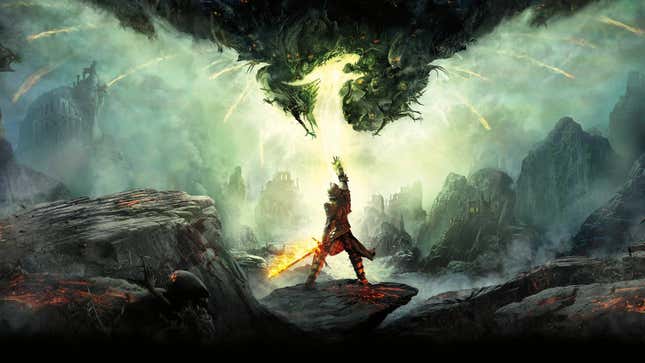
Hollywood writers have been on strike ever since media executives and the Writer’s Guild of America failed to come to an agreement at the bargaining table. Now, multiple video game writers are currently having public discussions about how their craft is undervalued by those looking in from the outside. One of them is David Gaider, lead writer on the existing three Dragon Age games. He said that writing went from being valued to being “quietly resented” at BioWare, and indicated that the lack of support for writing at the studio in those later years contributed to his departure. Which is wild when you consider that it’s a studio known for story-rich RPGs.
Gaider started tweeting about how writing is “constantly undervalued” as a discipline, to the point where many don’t see the point in paying good money for good writing. He lamented that even those who wanted to enter the field sometimes see it as an easy profession to undertake, not one requiring “real skills” like art and programming. “Even BioWare, which built its success on a reputation for good stories and characters, slowly turned from a company that vocally valued its writers to one where we were quietly resented, with a reliance on expensive narrative seen as the ‘albatross’ holding the company back,” he wrote.
Gaider tweeted that this alleged cultural shift was a contributing factor to his departure in 2016, a year before EA acquired the studio. “Suddenly all anyone in charge was asking was ‘how do we have LESS writing?’ A good story would simply happen, via magic wand, rather than be something that needed support and priority.” Kotaku reached out to Gaider to ask why the alleged shift in values occurred, but did not receive a response by the time of publication.
The relationship between the WGA and game writers hasn’t been a chummy one, as the guild has allegedly been hesitant to include the latter in their ranks. In 2019, the guild removed an award for video game writing, a move that was hugely unpopular among game developers. However, some writers such as Mary Kenney of Insomniac Games have been vocal in their support for the writers’ strike.“The WGA has rather famously treated games writers like garbage for years, yet every games writer I’ve talked to fully supports the strike,” she tweeted. “So do I! Everyone deserves fair pay and treatment!”
Despite the complaints about disrespect from the guild, many visible game writers on Twitter see similar struggles in how writing is broadly undervalued. Some have cautioned others in their profession against accidentally crossing the picket line by accepting work from television studios. “Do not cross picket lines and do not scab,” tweeted a developer for an indie game. If you haven’t yet, join your local union!”
“Every video-game writer I’ve spoken to supports the writers’ strike. For some, it’s because we’ve worked in television and have felt the impact of our discipline being undervalued,” Kenney wrote in a statement to Kotaku. “For others, like myself, seeing the WGA proposals and their counters or outright rejections paints a clear picture of the threat to writers’ livelihoods. Writers of any discipline should be able to make a decent living doing the creative work that keeps TV studios’ lights on, not forced to work second and third jobs so an executive can get an extra seven-figure bonus at the end of the fiscal year.”